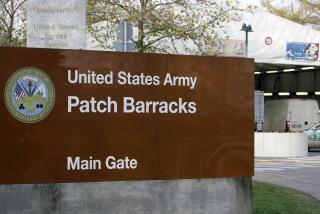Al Qaeda Might Strike U.S. Targets Overseas
- Share via
WASHINGTON — As the first anniversary of the Sept. 11 terrorist attacks nears, there is growing concern among U.S. officials and their allies in Europe, Asia and Africa that Al Qaeda terrorist cells have regrouped and are planning large-scale actions against U.S. targets overseas, authorities said Saturday.
Those fears have been intensifying for months, based on what some U.S. officials described as a steady increase in intelligence “chatter” about pending Al Qaeda activity, particularly in Europe, and a spate of recent arrests.
And though German authorities say they thwarted a possible Sept. 11 attack on a huge U.S. military base in Heidelberg, U.S. officials caution that there are indications that other U.S. military installations, U.S. embassies and even tourist sights frequented by Americans are now being targeted by organized and well-financed terrorist cells.
“We’ve been picking up chatter all summer,” said one Justice Department official.
U.S. law enforcement and intelligence authorities and their counterparts overseas have received no specific information as to the time or place of any attacks, the Justice Department official said. But the concerns about impending terrorist activity--perhaps pegged to Sept. 11, perhaps not--have come from a variety of trusted sources, the official said.
“There is a lot of very nonspecific information but from what we consider to be credible sources, as opposed to more specific information from sources that we would not consider credible,” said the official, who spoke on condition of anonymity. “It comes from certain people [being monitored or interrogated] and from certain intelligence-gathering agencies outside of our own.”
On Sept. 11, the Justice Department’s top counter-terrorism official, Assistant Atty. Gen. Michael Chertoff, will be in London for strategy meetings with his counterparts, the official said. And although those meetings were planned long ago, the official said, the recent indications of Al Qaeda activity have given Chertoff’s trip an increased sense of urgency.
In an interview, a senior State Department official who also requested anonymity confirmed that U.S. authorities are acutely concerned about the possibility of imminent attacks against embassies and other U.S. facilities worldwide.
Security at those installations has been enhanced, the State Department official said, but authorities fear that it might be insufficient to withstand an attack on the scale of the two truck bombings of U.S. embassies in Africa in 1998.
In April, suspected Al Qaeda operatives tried something new: detonating a bomb outside a Tunisian synagogue in a truck filled with gasoline for added explosive power. Twenty-one people, many of them German tourists, were killed.
U.S. embassies and other American facilities overseas are considered “soft targets,” in counter-terrorism parlance, because of the near impossibility of protecting them all. They have been a source of significant concern for years within the Clinton and Bush administrations--increasingly so after the embassy bombings in Tanzania and Kenya, which killed 224 people and injured thousands more.
Since those attacks, more than a dozen plots to attack U.S. embassies, military installations and other places where Americans congregate have been thwarted on several continents.
But as the symbolic date of Sept. 11 draws near, U.S. officials and their allies have sensed intensifying activity by some of the thousands of Al Qaeda soldiers believed to be on every continent where the United States maintains a diplomatic and military presence. They are able to remain undetected, authorities say, because Al Qaeda has maintained a well-entrenched network of followers who appear to be providing fake documents, financing and havens for those plotting attacks.
In addition to those belonging to organized Al Qaeda cells, authorities say, there are thousands of additional supporters of Al Qaeda’s jihad, or holy war, against the West. U.S. officials say these individuals also might launch attacks.
“Prior to 9/11, we were extremely concerned about U.S. facilities in Turkey and elsewhere in Europe as well as on the Arabian Peninsula,” said one Bush administration official familiar with the long-term counter-terrorism campaign. “They are going after all the same targets they did before.”
Last week, German police arrested a woman with U.S. and German passports and her Turkish fiance on suspicion of plotting an attack on the U.S. Army’s European headquarters. The authorities do not believe that the two were affiliated with any terrorist group. But according to the German magazine Der Spiegel, Astrid Eyzaguirre, who was employed at a store on the Heidelberg military base, warned a friend to stay away from the store in the days leading up to Sept. 11.
In Stockholm, authorities arrested a Swede of Tunisian origin on Aug. 29 on suspicion of planning to hijack and sabotage a British-bound aircraft.
Two days later, Dutch authorities arrested 12 men on suspicion of terrorist activity. And in June, authorities in Oman arrested--and then handed over to Canadian and later U.S. authorities--a suspected Al Qaeda operative with the code name “Sammy” who was believed to be one of two masterminds of a plot to attack the U.S. Embassy and other Western interests in Singapore.
Thwarting an attack against a U.S. embassy or military installation overseas may well be impossible, given the number of potential targets, officials said.
The senior State Department official said that Al Qaeda soldiers trained in Afghanistan have made their way to at least 95 countries in recent months.
A special investigative agency of the United Nations, in a report to be released this week, warns that potentially thousands of well-trained and well-financed Al Qaeda members have slipped out of Afghanistan and are now on the loose.
The cells, according to the U.N. “monitoring group” on Al Qaeda, “continue to move undetected across international boundaries.”
“They have sought shelter and hiding places in neighboring countries, or to transit these countries in order to reposition themselves, or to return to their places of origin,” the report says.
“There are also reports that Al Qaeda members have sought to enter Europe using falsified travel documents, traveling via well-established illegal immigration routes, including those extending from Central Asia, as well as from Turkey and the Balkans into the rest of Europe.”
Of primary concern to U.S. and European authorities is the fact that efforts to stop such an influx of terrorists have been largely unsuccessful.
The U.N. group, for instance, visited a number of border entry points and checked to determine whether individuals whose names were on a terrorist watch list “actually appeared in the controlled persons databases used by border officials.”
“This produced mixed results,” the report says. “Many of these [countries] indicated that they were unable to include some of the names from the list because of the lack of minimum required identifiers.”
U.S. authorities “are right to feel concerned that anything can happen,” said Magnus Ranstorp, a counter-terrorism expert who consults with several European nations on how to thwart future attacks. “The thinking [among European authorities] is that there is a clear and present danger.
“Of course the U.S. embassies, military and diplomatic installations are primary targets. They are easy targets to hit, and there is a clear and present danger, particularly on or about Sept. 11,” said Ranstorp, director of the Center for the Study of Terrorism and Political Violence at the University of St. Andrews in Scotland.
In recent days, Britain’s Scotland Yard has issued public warnings about potential attacks on Sept. 11, particularly at U.S. embassies and other places where American expatriates are planning memorial ceremonies.
But Ranstorp said law enforcement and intelligence officials in Europe believe that Al Qaeda and its legions of followers might wait, figuring that security will be too tight on that day.
“It may be that some loner out there launches attacks to capitalize on the date ... but it is unlikely that something major may happen,” Ranstorp said. “They are smart. They may let the hype of Sept. 11 pass and then wait a few weeks and strike again.
“It is true that we have underestimated them, even after 9/11. And it is certain that they will come back in some shape or form,” he added. “But what form will that take? And when?”
More to Read
Sign up for Essential California
The most important California stories and recommendations in your inbox every morning.
You may occasionally receive promotional content from the Los Angeles Times.













